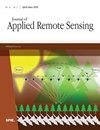Detection of intrinsic variants of an endmember in hyperspectral images based on local spatial and spectral features
IF 1.4
4区 地球科学
Q4 ENVIRONMENTAL SCIENCES
引用次数: 0
Abstract
In recent years, addressing spectral variability in hyperspectral data has improved blind hyperspectral unmixing performance and gained attention in endmember detection applications. Current approaches to address the problem of spectral variability associate the variabilities with the valid endmember and attempt to mitigate the ill-effects caused by them. However, intrinsic variabilities induced by material-specific compositional changes are crucial for identifying within-class materials like diverse soil types, forest species, and urban areas. Despite this significance, no studies have attempted a direct implementation to explicitly identify the intrinsic variants of an endmember. In this paper, we propose a framework to solve two important problems: first, to separate the intrinsic variants from illumination-based variants, and second, to simultaneously estimate the number of intrinsic variants and extract their spectral signatures without any knowledge of the number of such sources. The proposed method utilizes a spectral analysis technique with local minima/maxima to remove illumination-based variabilities, followed by a simplex-volume maximization-based reordering of potential endmembers and an iterative reconstruction error-based technique to simultaneously count the number of intrinsic variants and capture their signatures. The approach is validated on synthetic and real datasets, showcasing comparable results with state-of-the-art methods.基于局部空间和光谱特征检测高光谱图像中内构件的内在变体
近年来,解决高光谱数据中的光谱变异性问题提高了盲高光谱非混合性能,并在内含物检测应用中受到关注。目前解决光谱变异性问题的方法是将变异性与有效末元联系起来,并试图减轻变异性造成的不良影响。然而,由特定材料成分变化引起的内在变异性对于识别类内材料(如不同的土壤类型、森林物种和城市区域)至关重要。尽管具有重要意义,但目前还没有研究尝试直接实现明确识别末端成员的内在变异。在本文中,我们提出了一个框架来解决两个重要问题:首先,将固有变体从基于光照的变体中分离出来;其次,在不知道固有变体数量的情况下,同时估算固有变体的数量并提取其光谱特征。所提出的方法利用具有局部最小值/最大值的光谱分析技术来去除基于光照的变异,然后利用基于简单体积最大化的潜在内成员重排序和基于迭代重建误差的技术来同时计算内在变异的数量并捕捉其特征。该方法在合成和真实数据集上进行了验证,结果与最先进的方法不相上下。
本文章由计算机程序翻译,如有差异,请以英文原文为准。
求助全文
约1分钟内获得全文
求助全文
来源期刊

Journal of Applied Remote Sensing
环境科学-成像科学与照相技术
CiteScore
3.40
自引率
11.80%
发文量
194
审稿时长
3 months
期刊介绍:
The Journal of Applied Remote Sensing is a peer-reviewed journal that optimizes the communication of concepts, information, and progress among the remote sensing community.
 求助内容:
求助内容: 应助结果提醒方式:
应助结果提醒方式:


